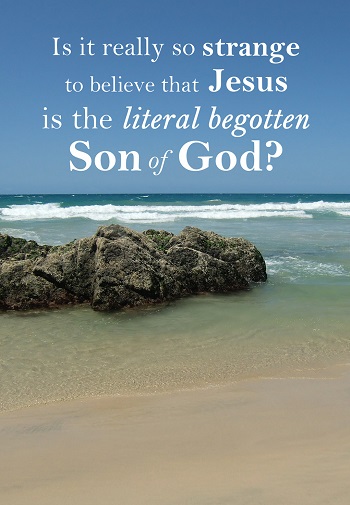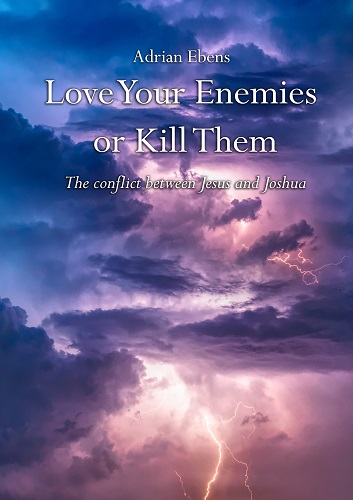The Word Made Flesh - RH April 5, 1906
Maranathamedia.com Note: This article is almost a constant stream of quotable quotes. It is worth reading and re-reading several times. It strings together John 1, Heb 1&2, Rom 1, Prov 8:22-30 and 1 Cor 1:24 in a tight paradox of the eternal begotten Son who is Wisdom. It avoids the mistake of placing the begetting of Christ in the realm of time which many pioneers fell into and it holds the begotten identity which nearly all current scholars have sadly abandoned.
The Word Made Flesh
RH April 5, 1906
Mrs. E. G. White
[REPRINTED BY REQUEST, FROM THE SIGNS OF THE TIMES OF APRIL 26, 1899.]
[Reprinted Again in RH Sep 14 1922 and Dec 19 1974]
"In the beginning was the Word, and the Word was with God, and the Word was God. The same was in the beginning with God. All things were made by him; and without him was not anything made that was made. In him was life; and the life was the light of men. And the light shineth in darkness; and the darkness comprehended it not. . . . And the Word was made flesh, and dwelt among us (and we beheld his glory, the glory as of the only begotten of the Father), full of grace and truth."
This chapter delineates the character and importance of the work of Christ. As one who understands his subject, John ascribes all power to Christ, and speaks of his greatness and majesty. He flashes forth divine rays of precious truth, as light from the sun. He presents Christ as the only Mediator between God and humanity.
The doctrine of the incarnation of Christ in human flesh is a mystery, "even the mystery which hath been hid from ages and from generations." It is the great and profound mystery of godliness. "The Word was made flesh, and dwelt among us." Christ took upon himself human nature, a nature inferior to his heavenly nature. Nothing so shows the wonderful condescension of God as this. He "so loved the world, that he gave his only begotten Son." John presents this wonderful subject with such simplicity that all may grasp the ideas set forth, and be enlightened.
Christ did not make believe take human nature; he did verily take it. He did in reality possess human nature. "As the children are partakers of flesh and blood, he also himself likewise took part of the same." He was the son of Mary; he was of the seed of David according to human descent. He is declared to be a man, even the Man Christ Jesus. "This Man," writes Paul, "was counted worthy of more glory than Moses, inasmuch as he who hath builded the house hath more honor than the house."
But while God's Word speaks of the humanity of Christ when upon this earth, it also speaks decidedly regarding his pre-existence. The Word existed as a divine being, even as the eternal Son of God, in union and oneness with his Father. From everlasting he was the Mediator of the covenant, the one in whom all nations of the earth, both Jews and Gentiles, if they accepted him, were to be blessed. "The Word was with God, and the Word was God." Before men or angels were created, the Word was with God, and was God.
The world was made by him, "and without him was not anything made that was made." If Christ made all things, he existed before all things. The words spoken in regard to this are so decisive that no one need be left in doubt. Christ was God essentially, and in the highest sense. He was with God from all eternity, God over all, blessed forevermore.
The Lord Jesus Christ, the divine Son of God, existed from eternity, a distinct person, yet one with the Father. He was the surpassing glory of heaven. He was the commander of the heavenly intelligences, and the adoring homage of the angels was received by him as his right. This was no robbery of God. "The Lord possessed me in the beginning of his way," he declares, "before his works of old. I was set up from everlasting, from the beginning, or ever the earth was. When there were no depths, I was brought forth; when there were no fountains abounding with water. Before the mountains were settled, before the hills was I brought forth; while as yet he had not made the earth, nor the fields, nor the highest part of the dust of the world. When he prepared the heavens, I was there: when he set a compass upon the face of the depth."
There are light and glory in the truth that Christ was one with the Father before the foundation of the world was laid. This is the light shining in a dark place, making it resplendent with divine, original glory. This truth, infinitely mysterious in itself, explains other mysterious and otherwise unexplainable truths, while it is enshrined in light, unapproachable and incomprehensible.
"Before the mountains were brought forth, or ever thou hadst formed the earth and the world, even from everlasting to everlasting, thou art God." "The people which sat in darkness saw great light; and to them which sat in the region and shadow of death light is sprung up." Here the pre-existence of Christ and the purpose of his manifestation to our world are presented as living beams of light from the eternal throne. "Now gather thyself in troops, O daughter of troops: he hath laid siege against us: they shall smite the Judge of Israel with a rod upon the cheek. But thou, Bethlehem Ephratah, though thou be little among the thousands of Judah, yet out of thee shall he come forth unto me that is to be ruler in Israel; whose goings forth have been from of old, from everlasting." "We preach Christ crucified," declares Paul, "unto the Jews a stumbling-block, and unto the Greeks foolishness; but unto them which are called, both Jews and Greeks, Christ the power of God, and the wisdom of God."
That God should thus be manifest in the flesh is indeed a mystery; and without the help of the Holy Spirit we can not hope to comprehend this subject. The most humbling lesson that man has to learn is the nothingness of human wisdom, and the folly of trying, by his own unaided efforts, to find out God. He may exert his intellectual powers to the utmost, he may have what the world calls a superior education, yet he may still be ignorant in God's eyes. The ancient philosophers boasted of their wisdom; but how did it weigh in the scale with God? Solomon had great learning; but his wisdom was foolishness; for he did not know how to stand in moral independence, free from sin, in the strength of a character molded after the divine similitude. Solomon has told us the result of his research, his painstaking efforts, his persevering inquiry. He pronounces his wisdom altogether vanity.
By wisdom the world knew not God. Their estimation of the divine character, their imperfect knowledge of his attributes, did not enlarge and expand their mental conception. Their minds were not ennobled in conformity to the divine will, but they plunged into the grossest idolatry. "Professing themselves to be wise, they became fools, and changed the glory of the uncorruptible God into an image made like to corruptible man, and to birds, and four-footed beasts, and creeping things." This is the worth of all requirements and knowledge apart from Christ.
"I am the Way, the Truth, and the Life," Christ declares; "no one cometh unto the Father, but by me." Christ is invested with power to give life to all creatures. "As the living Father hath sent me," he says, "and I live by the Father; so he that eateth me, even he shall live by me. . . .It is the spirit that quickeneth; the flesh profiteth nothing; the words that I speak unto you, they are spirit, and they are life." Christ is not here referring to his doctrine, but to his person, the divinity of his character. "Verily verily, I say unto you," he says again, "The hour is coming, and now is, when the dead shall hear the voice of the Son of God: and they that hear shall live. For as the Father hath life in himself; so hath he given to the Son to have life in himself; and hath given him authority to execute judgment also, because he is the Son of man."
God and Christ knew from the beginning, of the apostasy of Satan and of the fall of Adam through the deceptive power of the apostate. The plan of salvation was designed to redeem the fallen race, to give them another trial. Christ was appointed to the office of Mediator from the creation of God, set up from everlasting to be our substitute and surety. Before the world was made, it was arranged that the divinity of Christ should be enshrouded in humanity. "A body," said Christ, "hast thou prepared me." But he did not come in human form until the fulness of time had expired. Then he came to our world, a babe in Bethlehem.
No one born into the world, not even the most gifted of God's children, has ever been accorded such demonstration of joy as greeted the Babe born in Bethlehem. Angels of God sang his praises over the hills and plains of Bethlehem. "Glory to God in the highest," they sang, "and on earth peace, good will toward men." O that today the human family could recognize this song! The declaration then made, the note then struck, the tune then started, will swell and extend to the end of time, and resound to the ends of the earth. It is glory to God, it is peace on earth, good will to men. When the Sun of Righteousness shall arise with healing in his wings, the song then started in the hills of Bethlehem will be re-echoed by the voice of a great multitude, as the voice of many waters, saying, "Alleluia, for the Lord God omnipotent reigneth."
By his obedience to all the commandments of God, Christ wrought out a redemption for man. This was not done by going out of himself to another, but by taking humanity into himself. Thus Christ gave to humanity an existence out of himself. To bring humanity into Christ, to bring the fallen race into oneness with divinity, is the work of redemption. Christ took human nature that men might be one with him as he is one with the Father, that God may love man as he loves his only begotten Son, that men may be partakers of the divine nature, and be complete in him.
The Holy Spirit, which proceeds from the only begotten Son of God, binds the human agent, body, soul, and spirit, to the perfect, divine-human nature of Christ. This union is represented by the union of the vine and the branches. Finite man is united to the manhood of Christ. Through faith human nature is assimilated with Christ's nature. We are made one with God in Christ.



